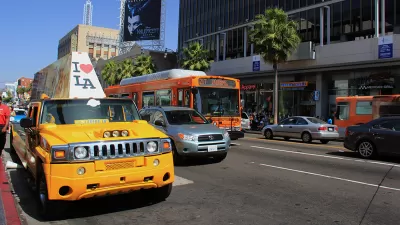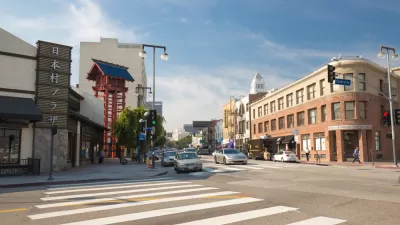The Los Angeles City Council voted to officially end the use of Level of Service in measuring environmental impact in favor of a more people-friendly measure: vehicle miles traveled.

Joe Linton reports from Lo Angeles, where the City Council recently approved a substantial change to environmental review in accordance with the California Environmental Quality Act (CEQA).
Linton describes the consequences of choosing LOS as the primary measure of a development project's impact:
LOS is a way of measuring traffic, though it perniciously and simplistically only measures car traffic, and doesn’t even do that meaningfully. Measuring for LOS shows any project that increases car congestion – such as building new housing – as adversely impacting the environment. To supposedly fix congestion – the adverse environmental impact of that new housing – LOS measurements end up requiring more space for cars, so a housing project might also have to widen the road. LOS incorrectly assumes that car traffic is a static quantity, denying the effects of induced travel. LOS said that the 405 Freeway would be less congested after it was widened. That didn’t happen.
The change from LOS to VMT was mandated by SB 743, a law approved by the state of California in 2013. Several cities in the state have already made the switch, including Pasadena and San Francisco. Outside of the state, Seattle is also working on reforming its use of Level of Service as a measure of development impact mitigation.
For more details on the effort by the city of Los Angeles to replace LOS analysis with VMT, see also a post by Steven Sharp from February 2019.
FULL STORY: Big Wonky Good News: L.A. City Adopts People-Centered Transportation Metric: “VMT” In, “LOS” Out

Alabama: Trump Terminates Settlements for Black Communities Harmed By Raw Sewage
Trump deemed the landmark civil rights agreement “illegal DEI and environmental justice policy.”

Study: Maui’s Plan to Convert Vacation Rentals to Long-Term Housing Could Cause Nearly $1 Billion Economic Loss
The plan would reduce visitor accommodation by 25% resulting in 1,900 jobs lost.

Why Should We Subsidize Public Transportation?
Many public transit agencies face financial stress due to rising costs, declining fare revenue, and declining subsidies. Transit advocates must provide a strong business case for increasing public transit funding.

Wind Energy on the Rise Despite Federal Policy Reversal
The Trump administration is revoking federal support for renewable energy, but demand for new projects continues unabated.

Passengers Flock to Caltrain After Electrification
The new electric trains are running faster and more reliably, leading to strong ridership growth on the Bay Area rail system.

Texas Churches Rally Behind ‘Yes in God’s Back Yard’ Legislation
Religious leaders want the state to reduce zoning regulations to streamline leasing church-owned land to housing developers.
Urban Design for Planners 1: Software Tools
This six-course series explores essential urban design concepts using open source software and equips planners with the tools they need to participate fully in the urban design process.
Planning for Universal Design
Learn the tools for implementing Universal Design in planning regulations.
Caltrans
Smith Gee Studio
Institute for Housing and Urban Development Studies (IHS)
City of Grandview
Harvard GSD Executive Education
Toledo-Lucas County Plan Commissions
Salt Lake City
NYU Wagner Graduate School of Public Service




























